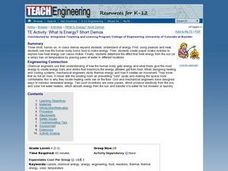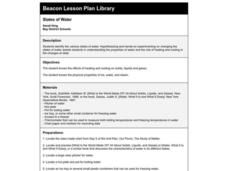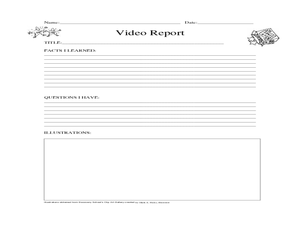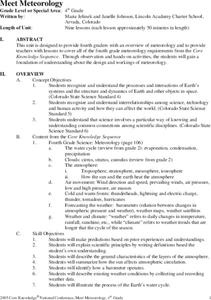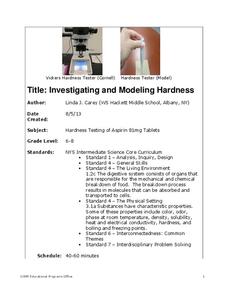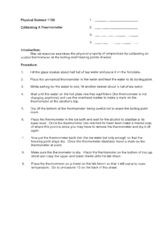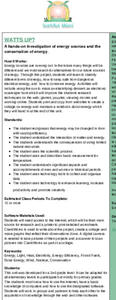University of Wisconsin
Rain Garden Maintenance
Maintaining a garden is an ongoing responsibility. This resource follows a series of activities in a unit that resulted in the planting of a rain garden. What you will find here are general instructions for watering, weeding, pruning,...
Teach Engineering
The Amazing Aerogel
Introducing ... the aerogel. The first of a two-installment series teaches young engineers about the properties and uses of aerogels. A PowerPoint presentation provides information about this unique material to help solidify the concept.
It's About Time
Renewable Energy Sources - Solar and Wind
There has been a huge solar energy spill! Let's go outside to play in it. This lesson includes multiple experiments showcasing solar and wind energies. Scholars build a solar heater and an anemometer before testing the results. The...
Curated OER
Space Shuttle Statistics
students are the opportunity to enhance their computation skills using real life statistics associated with the Space Shuttle. Skills emphasized include working with fractions, decimals, percents, ratios and proportions, comparing units,...
Curated OER
Energy from Hydrocarbons
In this energy from hydrocarbons activity, students read about endothermic and exothermic reactions and how hydrocarbons release heat as fuels. Students read how to measure heat changes in reactions and practice finding the specific heat...
Curated OER
What Is Energy? Short Demos
Students engage in three short, hands-on, in-class demos which expand students' understand of energy. First, using peanuts and heat, students see how the human body burns food to make energy. Then, they create paper snake mobiles to...
Curated OER
Capturing the Sun's Warmth
Students explore the variety of ways to use solar energy. They investigate the thermal energy storage capacities of different test materials to determine which to use in passive solar building design. They explain how passive solar...
Curated OER
STATES OF WATER
Students identify the various states of water. They use hypothesizing and hands-on experimenting on changing the states of water, the properties of water, and the role of heating and cooling in the changes of state.
Curated OER
Greenhouse Effect: A Computer Simulation
Young scholars complete an online simulation of the greenhouse effect. In this instructional activity on the greenhouse effect, students use a website, similar to a webquest, to simulate and answer questions on how the greenhouse effect...
Curated OER
Thermodynamics
In this thermodynamics worksheet, students answer 12 questions about energy, conduction, convection and radiation, heat, the conservation of energy and atoms at different temperatures.
Curated OER
Calorie Connection
Students calculate the calories in a Brazil nut and the calories needed for daily intake. In this calories lesson plan, students use calorimetry to measure the change in water temperature heated by the burning of a Brazil nut. They also...
Curated OER
Properties of Matter
Young scholars describe four states of matter and their characteristics, explain thermal expansion of matter, interpret state changes in terms of kinetic theory of matter, explain relationship between temperature and volume of a gas,...
Curated OER
How Hot and How Big?
Students explore star color and size. In this space science lesson, students conduct various inquiry activities to explore how the color of a star affects the amount of heat produced. They also investigate how the color of stars affects...
Curated OER
Meet Meteorology
Students explore meteorology, discuss Earth's atmosphere, create drawings of the water cycle, create meteorology journals, and role play forecasters. Nine lessons on one page; includes unit test.
Curated OER
The Effects of Storms
An excellent way to review a chapter or unit on storms, this worksheet features vocabulary review (gust, evacuation, storm surge, salinity), concept review (effects and details about hurricanes), skills/process review (normal high tide...
Curated OER
Seasons
Students investigate the reason for seasons on Earth during three activities. They construct a model of the Earth and Sun to identify patterns in the changes of the angle of light on the Earth's surface. Then they conduct a heat...
Curated OER
Creek Monitoring
Sixth graders conduct a variety of assessments at a local stream to determine if it is a suitable habitat for salmon. They measure temperature, tubidity, dissolved oxygen, pH levels, bacteria and nutrients. In this unit, 6th graders work...
Curated OER
Keeping Cool
Young scholars investigate the air conditioner units around the school. They chart the temperature by placing a thermometer in different situations and decide how to keep cool and save energy in the summer.
Teach Engineering
Weather Basics
Weather — there's more to it than meets the eye of the storm. With this resource young meteorologists learn about the basics of weather, including information about the factors that influence the weather, common weather vocabulary, and...
American Museum of Natural History
Take the Climate Quiz
Climate and weather are often confused. Pupils answer questions online to review concepts related to climate and weather changes. They get immediate feedback and additional facts with each question. The lesson is appropriate as a remote...
Aquarium of the Pacific
States of Matter: Making Ice Cream
Who knew that learning about the states of matter could taste so sweet? This fun hands-on lesson captures the attention of learners as they use what they know about solids, liquids, and gases to create their very own batch of ice cream.
Cornell University
Investigating and Modeling Hardness
Model hardness testing with a self-designed hardness test. Young scholars rate the hardness of different types of aspirin using the Vicker's Hardness scale. They then relate hardness to the solubility of each aspirin tablet.
Curated OER
Calibrating a Thermometer
Students calibrate an alcohol thermometer using the boiling and freezing point of water. In this physical science lesson, students explain what happens to boiling point of water as altitude increases. They calculate their experimental...
Curated OER
WATTS UP?
Second graders research the Internet as they classify different forms of energy, investigate electrical energy and how to conserve energy.







